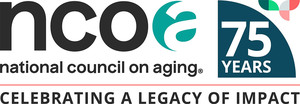
ARLINGTON, Va., Dec. 2, 2019 /PRNewswire/ -- A new survey by the National Council on Aging (NCOA) reveals an untold story about the nation's opioid epidemic—how the crisis is eroding the quality of life of older adults and the ability of local organizations to serve them.
"Older Americans are being harmed by the opioid crisis on all sides," said Anna Maria Chávez, NCOA Executive Vice President and Chief Growth Officer. "Some older adults are struggling with the personal tragedy of opioid addiction, while others are having to financially support their opioid-addicted children and even become caregivers for their grandchildren. This is hurting their health, draining their life savings, and destroying their financial security," Chávez added.
NCOA surveyed more than 200 community-based organizations in the aging network from 40 states and Puerto Rico. Among respondents, 70% reported an increased effort spent addressing issues related to the opioid epidemic affecting their older adult clients or their caregivers compared to two years ago. Despite this increase, only 28% of respondents said they routinely screen for substance misuse and abuse among the older adults they serve.
"More than 80% of the organizations responding to our survey reported that their older clients have little knowledge of safe and affordable alternatives to opioids, nor the best way to store and dispose of them. Now is the time to invest resources in educating older adults and the professionals who serve them on these critical issues," said Chávez.
Community-based organizations serving older adults reported a spike in issues related to opioids among their older clients.
- 70% said that compared to two years ago, they are spending more effort addressing opioid-related issues affecting their older clients and their caregivers.
- 20% said they have had to increase their opioid-related efforts by at least 25% and some reported increasing their efforts by over 50%.
The opioid epidemic is affecting older adults both physically and financially, according to survey respondents.
- 84% said their older clients have become more reliant on federal benefits.
- 81% said older adults do not understand safe, effective, and affordable alternatives to reducing pain without prescription opioid medications.
- 80% reported older adults facing challenges obtaining needed prescriptions or refills for opioid pain medication because of increased scrutiny and/or changing prescribing patterns.
- 80% said their older clients reported theft of pain medication by family members or others who use if for themselves to sell.
"The aging network, social services, and health care providers—as well as behavioral health care systems—all need to join forces now to advocate for a coordinated approach to solve the range of opioid issues affecting older adults and their families," Chávez said. "This survey is the first step in identifying the issue—and a path forward." In response to the findings, NCOA proposes several recommendations, including:
- Improving the health literacy of older adults and their caregivers regarding appropriate opioid use.
- Offering older adults alternative approaches to opioid medication to manage chronic pain.
- Incorporating the older adult perspective in opioid efforts at the national, state, and local levels.
- Raising awareness of the risk factors for financial fraud and abuse.
- Educating older adults about public benefits and legal options.
- Mobilizing multiple service providers.
In the coming weeks, NCOA will host a webinar for stakeholders across the aging network to learn more about the report and recommendations. The webinar will feature the National Association of County and City Health Officials as a co-presenter to explain how local health departments approach opioid use prevention and response, and how local aging services providers can work with them in their community.
About NCOA
The National Council on Aging (NCOA) is a trusted national leader working to ensure that every person can age well. Since 1950, our mission has not changed: Improve the lives of millions of older adults, especially those who are struggling. NCOA empowers people with the best solutions to improve their own health and economic security—and we strengthen government programs that we all depend on as we age. Every year, millions of people use our signature programs BenefitsCheckUp®, My Medicare Matters®, and the Aging Mastery Program® to age well. By offering online tools and collaborating with a nationwide network of partners, NCOA is working to improve the lives of 40 million older adults by 2030. Learn more at ncoa.org and @NCOAging.
SOURCE National Council on Aging





Share this article